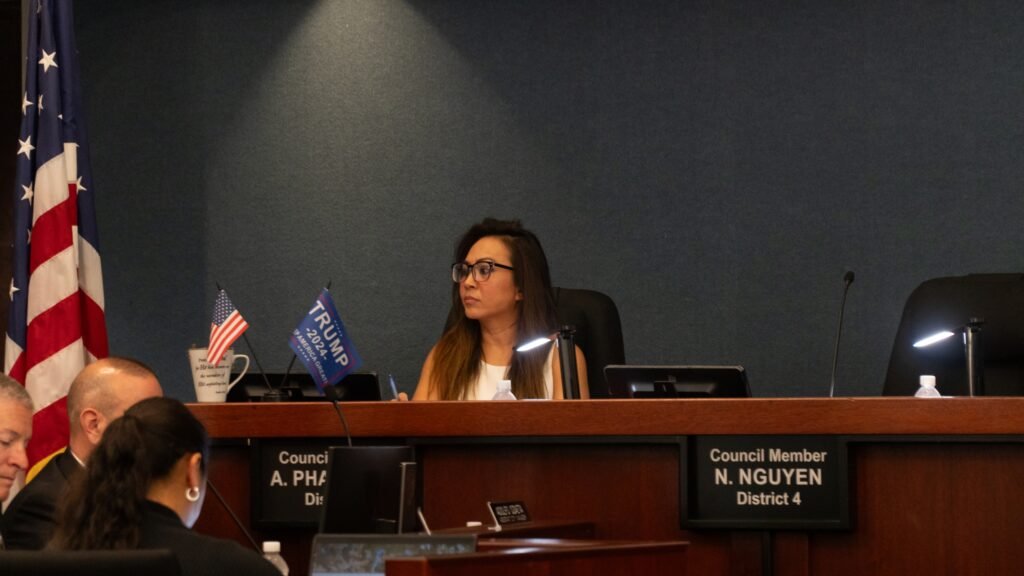Westminster Councilwoman Accused of Bribery Heads to Court; Legal Troubles Flare Up
As the sun rose over Westminster, California, the air was thick with anticipation and tension. An unassuming courthouse stood proud against the morning sky, the temporary home of a looming confrontation that merged law, ethics, and the expectations of an informed citizenry. Councilwoman Amy Phan West was set to face a judge over a misdemeanor charge related to allegedly attempting to bribe parking enforcement officers to prevent her husband’s car from being towed. In the community, voices simmered with disbelief and frustration, all pointing to larger implications regarding public trust.
The Unfolding Allegations
The saga began in January when Phan West was charged with attempting to bribe officers. While she has consistently denied the charges, the ethical undercurrents raised by the accusation have left many residents questioning not just her character, but the integrity of local governance. “It’s not merely a parking issue,” remarked Terry Rains, a Westminster resident involved in gathering community signatures against the proposed diversion program, “it’s a public corruption issue.”
Phan West’s attorney, Randy Collins, argues that the councilwoman’s request for a court-ordered diversion program—a route that could potentially lead to a complete dismissal of charges—demonstrates her commitment to being fiscally responsible. “This legal remedy would mitigate costs for taxpayers while allowing for an innocent individual to avoid a misguided legal process,” he stated in a recent email. Yet, not everyone is convinced of her innocence or intentions.
A Community Divided
The community remains deeply polarized regarding Phan West’s conduct. Over a hundred residents, fueled by anger and disappointment, signed a petition expressing their discontent with the possibility of a diversion program. “An erasure of this issue would send a clear message that accountability isn’t for those in power,” the petition reads, a sentiment that echoes similar calls for transparency among elected officials.
- Key Concerns Raised by Residents:
- Development of public trust in elected officials.
- Perceived double standards in accountability.
- The implication of ethical breaches on community governance.
Dr. Helen Thompson, a political ethics scholar, emphasizes the importance of transparency in governance. “The public perception of misconduct can erode trust far beyond the immediate scandal,” she said. “When elected officials are seen sidestepping accountability, it sets a concerning precedent that can lead to widespread mistrust, undermining the entire democratic process.”
The Wider Context
The charges against Phan West also sit within a troubling context of her previous conduct at City Council sessions. In the past year, she faced censure from fellow council members for behavior considered disruptive and unbecoming of an elected official. This included a series of allegations ranging from divulging confidential information to publicly berating residents and city staff. Such patterns of behavior raise questions about her fitness for office and the standards to which public officials should be held.
This turmoil has not just affected the councilwoman; it ripple effects across her colleagues. Her fellow council member, NamQuan Nguyen, has faced his own set of legal challenges, including a default ruling that restricts him from unrecognized speech during meetings and requires him to pay restitution to the city. “We’re witnessing a serious fracturing within our city government,” noted Dr. Emily Sanders, a local governance expert. “When elected representatives violate established norms, it affects the fabric of community leadership and undermines public accountability.”
Impacts on Local Governance
The implications of councilwoman Phan West’s conduct extend far beyond her individual situation. As legal proceedings continue, Westminster finds itself at a crossroads. With the potential for steep costs related to a jury trial, the financial burden may weigh heavily on taxpayers. However, the underlying issue remains one of ethics and integrity, leading to calls for systemic re-evaluation of how transgressions by public officials are managed.
The ongoing division among residents highlights a critical disconnect between the constituents’ demand for accountability and the current framework of political answers. As Rains succinctly summarized, “It’s past time for our elected officials to recognize that their actions have real consequences.”
Looking Ahead
As the court proceedings unfold, Westminster residents brace themselves for the inevitable revelations that will follow. Previous community meetings have shown a growing interest in establishing stricter ethics guidelines for elected officials, aiming to restore trust in local governance. However, substantive change requires a collective effort from both citizens and their representatives.
As Westminster finds itself amidst a maze of legal disputes, ethical dilemmas, and calls for accountability, it serves as an instructive case study on the precarious balance of power in local governance. The community’s response will not only shape the outcome for Amy Phan West but also set a precedent for how similar situations are handled in the future, ensuring the voices of the people resonate in the corridors of power for years to come.





